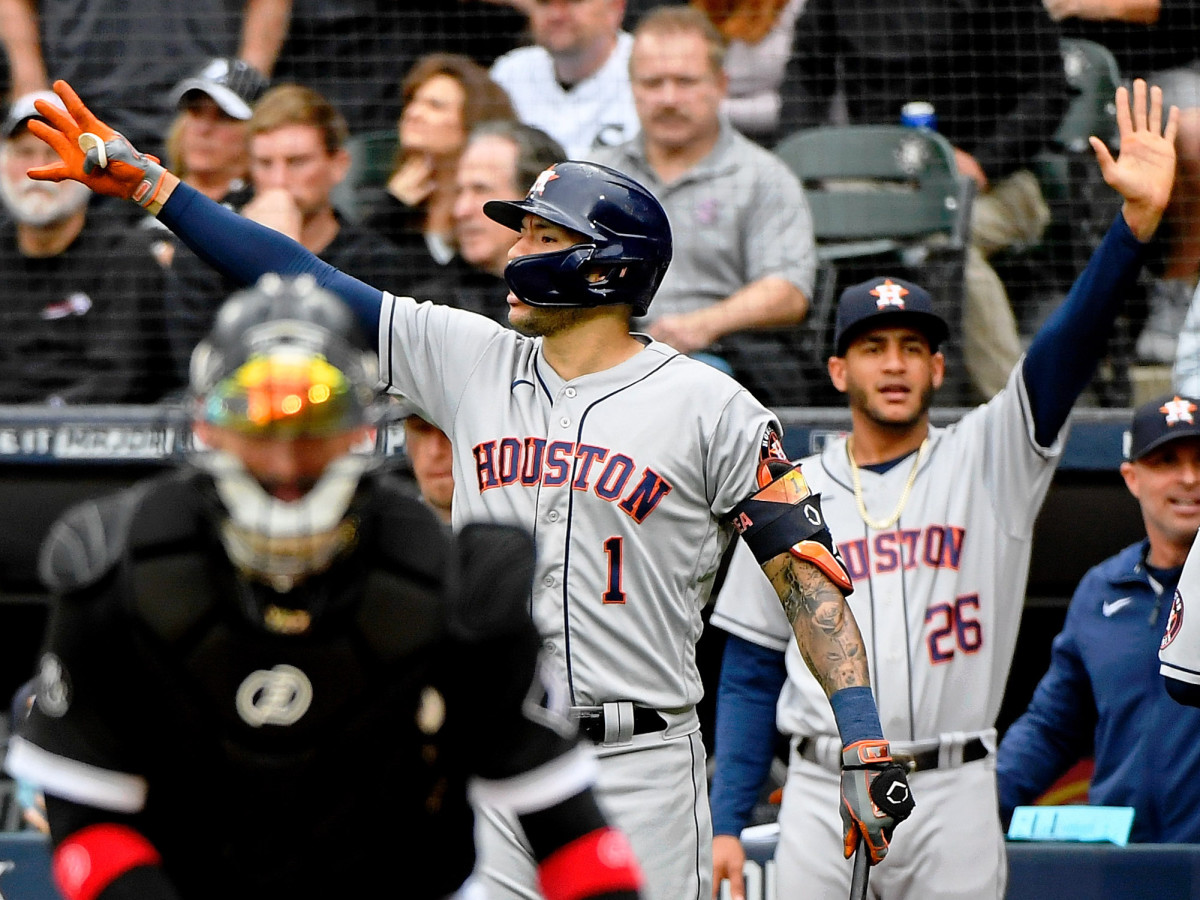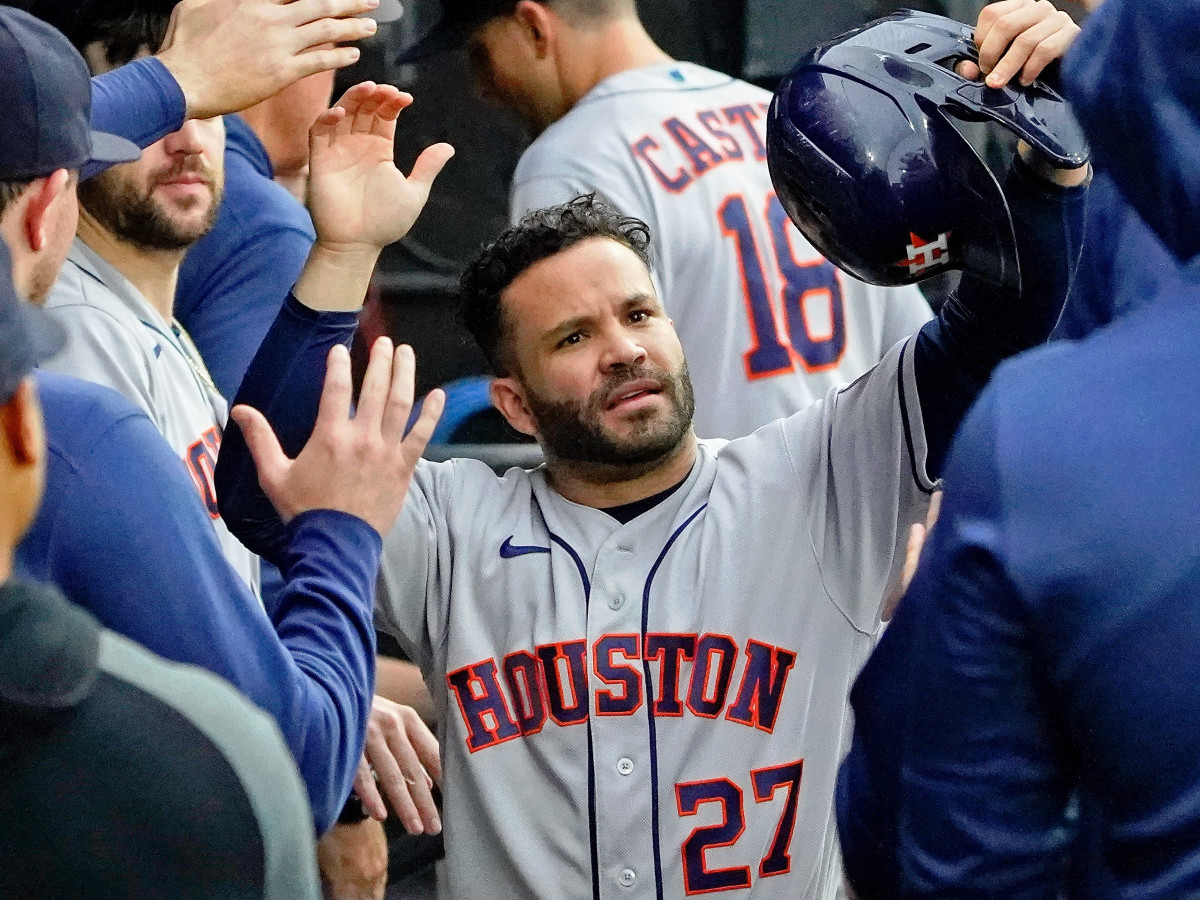Astros Epitomize the Importance of Adjustments

CHICAGO – At a hitters’ meeting before the American League Division Series, Astros shortstop Carlos Correa provided the cartography for what would be Houston’s fifth straight trip to the championship series.
“Guys, if we try to swing for home runs the way these guys do,” Correa told his teammates, referring to their opponent, the White Sox, “we’ll be going home. We’ve got to take our walks, stay short, hit the ball up the middle.”
The Astros never left the trail map. They stayed faithful to his direction, and wiped out Chicago in four games, the last one a 10–1 pasting that stood as the biggest blowout among the 56 all-time ALDS clinchers. Houston staged an offensive October clinic. It piled up 40 hits, 31 runs and 18 walks in the four games. The Astros allowed Chicago fives leads and wiped out all but one of them. They worked over White Sox starters so painstakingly that the best rotation in the league lasted a total of just 12 1/3 innings over four games.
“Like trying to hold back water with your hands” is how Dave Winfield once described the relentlessness of the 1993 Blue Jays. Such tribute befits the Astros as well. They smacked grounders and line drives through the middle, spat on pitches outside the zone and swiped bases right out from under the noses of careless Chicago pitchers.
The Astros have played .590 baseball in the postseason over these past five years, a stupendously impressive rate of winning under the harshest conditions, and it is largely because of a contact-heavy offense that is more a constant nuisance, like a case of poison sumac, than a sledgehammer. But this season is of a different kind in this five-part series in which infielders Correa, Jose Altuve, Alex Bregman and Yuli Gurriel have played in all 61 games in the run. In this one they have embraced a villainous role.

The two games here were the first postseason games the Astros have played in front of fans since their 2017 sign-stealing scheme was discovered and adjudicated in 2019-20. Mock them. Curse them. Doubt them. Just know that when you do, you also motivate them. Just ask White Sox pitcher Ryan Tepera.
“What he said gave us extra motivation,” Astros hitting coach Alex Cintrón says. “We saw it. Yes, we talked about it. This team uses s--- like that. It’s like playing on the road and the fans getting on us. We use it for extra motivation. We’re going to show you. We deal with it all the time.”
Sign up to get the Five-Tool Newsletter in your inbox every day during the MLB playoffs.
It is one thing for fans to zing the Astros. It is quite another for the arrows to come from the quiver of a fellow competitor. Tepera decided a 12–6 White Sox win in Game 3 was a good time to accuse the Astros of cheating still. He referred to “sketchy stuff” the Astros did in the past and linked it to how they swung and missed more often at Guaranteed Rate Field than they did at Minute Maid Park in the first two games. The inference: the Astros were cheating at home.
“Disrespectful and not based on facts,” Correa says. “It’s like I tell our guys, ‘You can talk s---, but if you talk s--- you better have the facts.’ If you don’t, you lose credibility. It’s unfortunate for him that he used those words, because it certainly made us more hungry.”
Said Astros manager Dusty Baker when first told of the comment, “I never heard his name before we played the White Sox.”
Says Houston pitcher Lance McCullers Jr., “I’m with Dusty. I really didn’t know who he was. I thought that was pretty bad timing after we had scored six runs that night. I don’t know whether he was looking for retweets or more Instagram followers or just wanted to throw some s--- out there, but I think what we did today [in Game 4] spoke volumes.
“We outplayed them in every aspect of the game. We’re the better team. That was clear.”
What Tepera said was dumb more than intentionally malicious. Why go there at all? The effect of going there was going to be nothing but helpful to the Astros and unhelpful to his team. Anyway, the White Sox had far more egregious home/road splits than did Houston this year.
“That’s not really the story,” Tepera had said after quickly trying to defuse his claim. “All we have to do is execute pitches and they can’t hit ‘em anyway.”
Wrong again. The Astros scored the most runs and had the lowest strikeout rate in the majors this year. The White Sox had the best strikeout stuff in the league. But everywhere Chicago turned for swings and misses in this series the Astros seemed to have an answer.
“What makes this offense so tough is the way they make adjustments,” Cintrón says. “We didn’t expect [Carlos] Rodón to come out throwing 97 today. But you know what? Michael Brantley came back to the dugout in the first inning and he goes, ‘Guys, his slider is not that good today.’ This team is on top of everything. The way they make adjustments is amazing.”
Watch MLB games online this postseason with fuboTV: Start with a 7-day free trial!
Another example: Correa came to the plate in the third inning with two outs and Chicago leading, 1-0. All the energy Rodón expelled in the first inning started to take its toll. (Rodón hit 99 mph for the first time since July 18, screamed after a strikeout of Bregman and bounced around the dugout afterward like a prize fighter. For a guy who threw five innings in the previous three weeks, you could see him burning fuel at a too-rapid rate.)
Rodón’s velocity began to dip. He loaded the bases on a hit by pitch and two walks. White Sox manager Tony La Russa had Michael Kopech warmed, but for some reason didn’t bring him in to get a fresh and right-handed arm on Correa. Rodón jumped ahead in the count, 0-2.
“I was absolutely sitting on fastball,” Correa says. “Bases loaded, two outs, two strikes, I saw the way he pounded his chest after that first inning. There was no doubt in my mind—bases loaded, crowd going wild—what he was going to try to do. I just told myself to get on top of it.”
Correa does not pull fastballs. The last time he pulled a pitch 95 mph or more for an extra-base hit was four years ago, a double off Luis Severino of the Yankees in 2017. But this time he was so sure that Rodón was going to try to beat him with velocity that he sold out for it. He smashed the ensuing 97-mph heater to left field for a two-run double.
Who else?#ForTheH pic.twitter.com/6SdhcJzX1l
— Houston Astros (@astros) October 12, 2021
These are the kind of smart, little victories the Astros pile up. They had not stolen a base for 11 straight games coming into this series, but when White Sox pitchers were clumsily slow to the plate, they took bags. When Chicago reliever Garrett Crochet left a 3-0 fastball over the plate to Bregman, as if anticipating a free strike, the third baseman punished it for a two-run double.
The Astros play offensive baseball the way the martial artist Bruce Lee moved through space: with agility and awareness of the environment and the moment. “Be like water making its way through cracks,” Lee said. “Do not be assertive, but adjust to the object, and you shall find a way around or through it. If nothing within you stays rigid, outward things will disclose themselves.”
The beauty of how the Astros play offense goes beyond bat-and-ball skills. It’s the knowledge of understanding in the moment what is required as game variables change: inning, score, outs, pitch sequence, pitch plans, etc.
“In the game today, front offices give information to you,” Correa says. “What we do here is that players give information to each other. Listen, we have the Trackman information. We know how nasty their pitches are, how they spin, all that stuff. They have a great staff. But when you’re actually playing the game it’s a different story. Here we rely on the information from the players. We’re always helping each other out. That’s what we do.”

After the Red Sox dispatched Tampa Bay Monday night, Correa texted Boston manager Alex Cora, his friend and former Astros bench coach who was banned from baseball in 2020 because of the cheating scandal. The message was on Cora’s phone before Cora even got back to the clubhouse. “Congratulations. See you soon.”
On Tuesday, Cora returned the favor. His message to Correa was waiting for the shortstop after the last out of Game 4.
Cora has called Cintrón “my best friend.” He was Cintrón’s best man at his wedding. They spoke after Boston’s win against Tampa Bay.
“He was emotional,” Cintrón says. “I know what he’s gone through. And especially what his family has gone through.”
VERDUCCI: Inside Alex Cora's Second Chance
When Houston met Boston in the 2018 ALCS, Cora and Cintrón made a vow: no texting or talking to one another once the series started.
“We sent like really long texts right before the series,” Cintrón says, “but once it started we stuck to it. We didn’t talk. We’ll have to do the same thing this time.”
Twenty-one months ago, this ALCS might have seemed unimaginable. Cora, thrown out of the game for being an active participant in the sign-stealing scandal, managing against the Astros. Cora wasn’t sure if he would get another job. The Astros were supposed to wilt under the scrutiny and shame.
Here they are. Emily Dickinson once observed that “action is redemption.” Or as Reggie Jackson says in a favorite truism from his father, “As long as you have a bat in your hand, you have a chance to re-write the story.” The stain from 2017 is permanent. Seventy years later the 1951 Giants are still linked to a telescope, just as the Astros will be to a trash can 70 years from now. But Cora and the Astros are moving on.
These are two of the four best offenses in baseball. Boston, at No. 4, is an aggressive-swinging bunch that has leveraged tiny Fenway Park into the most doubles and highest batting average and on-base percentage of all home splits. Houston, at No. 1, perseveres with its Bruce Lee offense. Like them or loathe them, the Astros shall find their way around or through.
More MLB Coverage:
• Freeman's HR Slams Door on Brewers; Braves Back in NLCS
• Inside Kris Bryant's Journey From Chicago to San Francisco
• Boston's Small-Ball Rally Shows New Side of Red Sox
• Why the Astros Are So Dangerous in the Postseason
Sports Illustrated may receive compensation for some links to products and services on this website.
